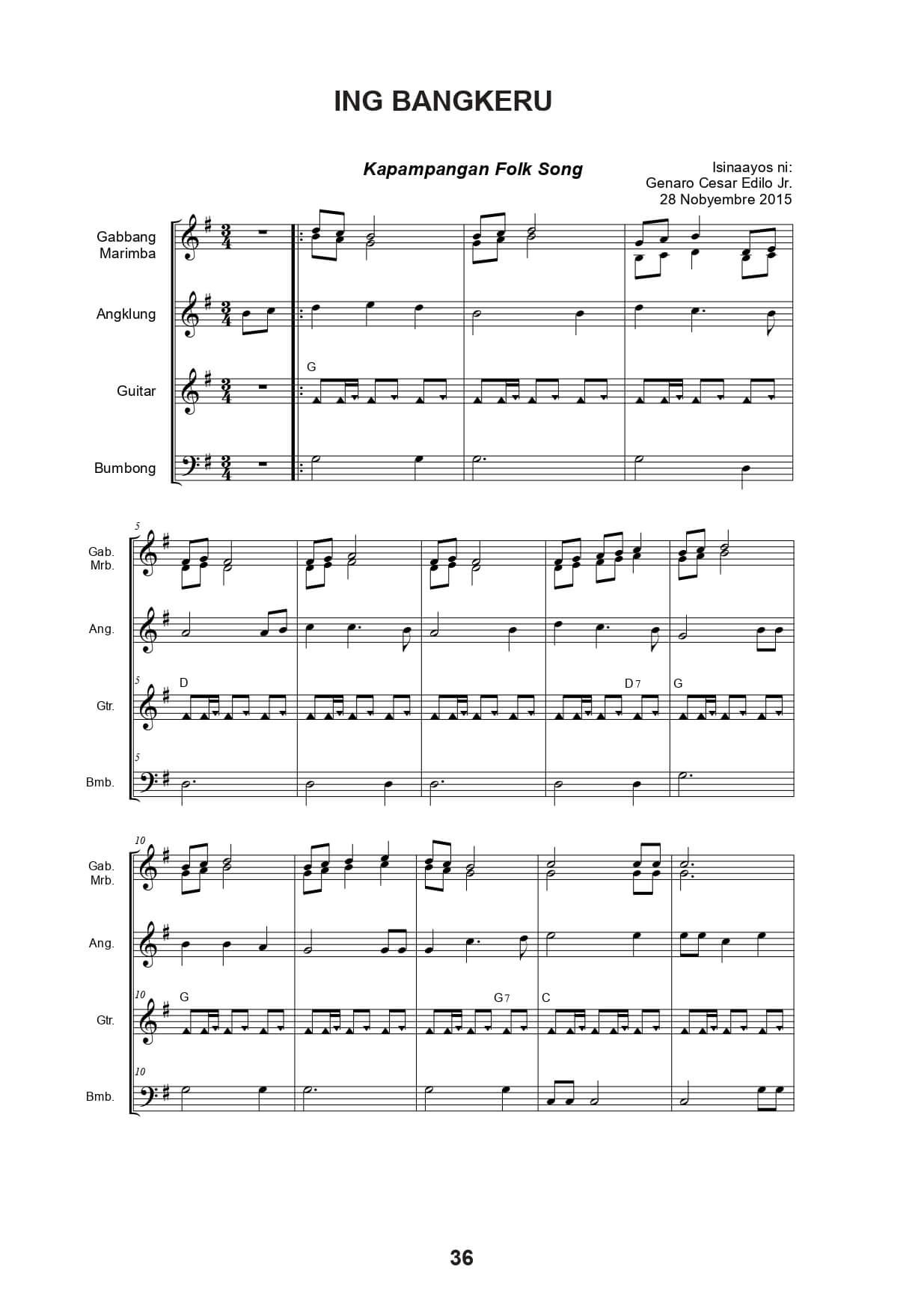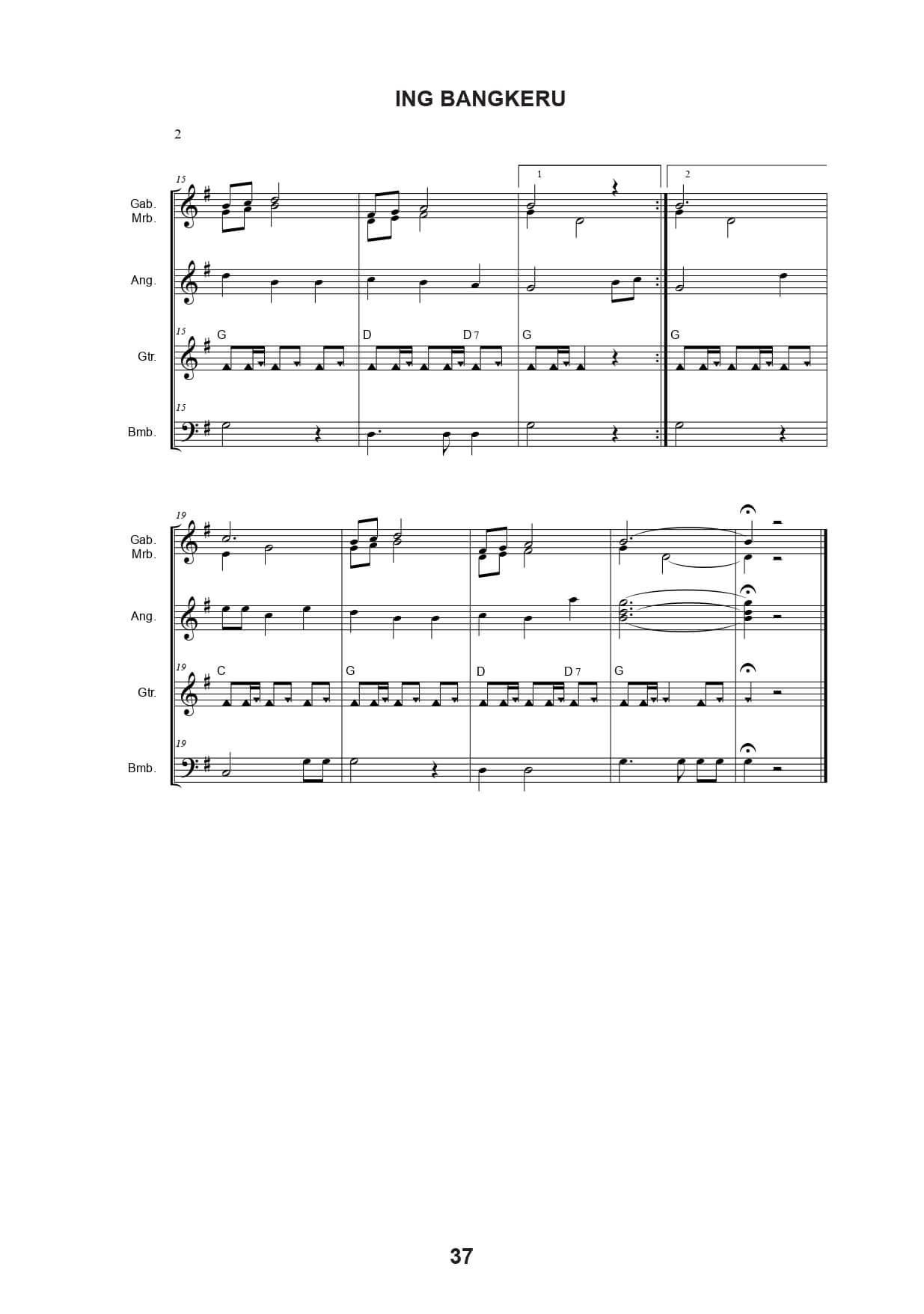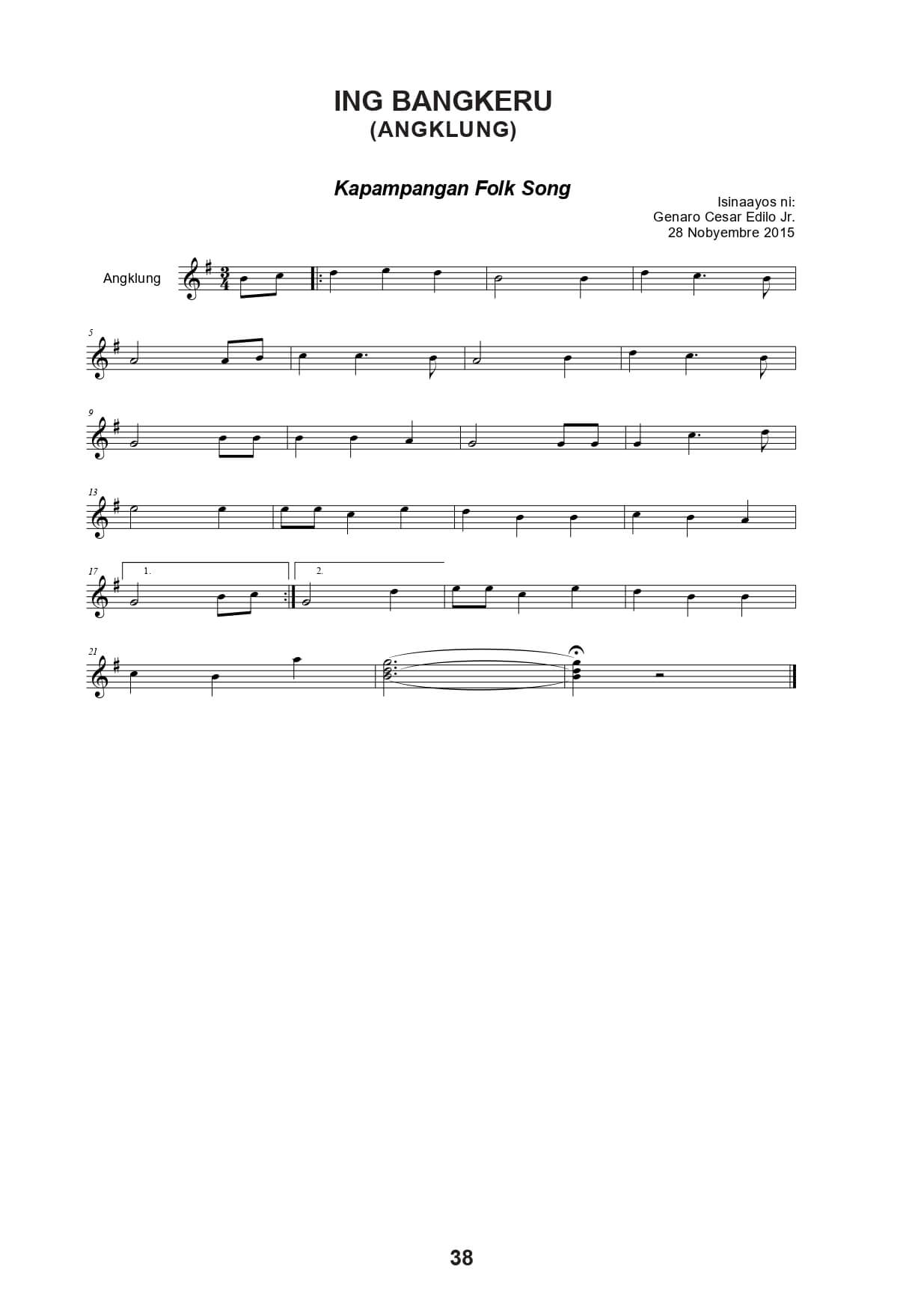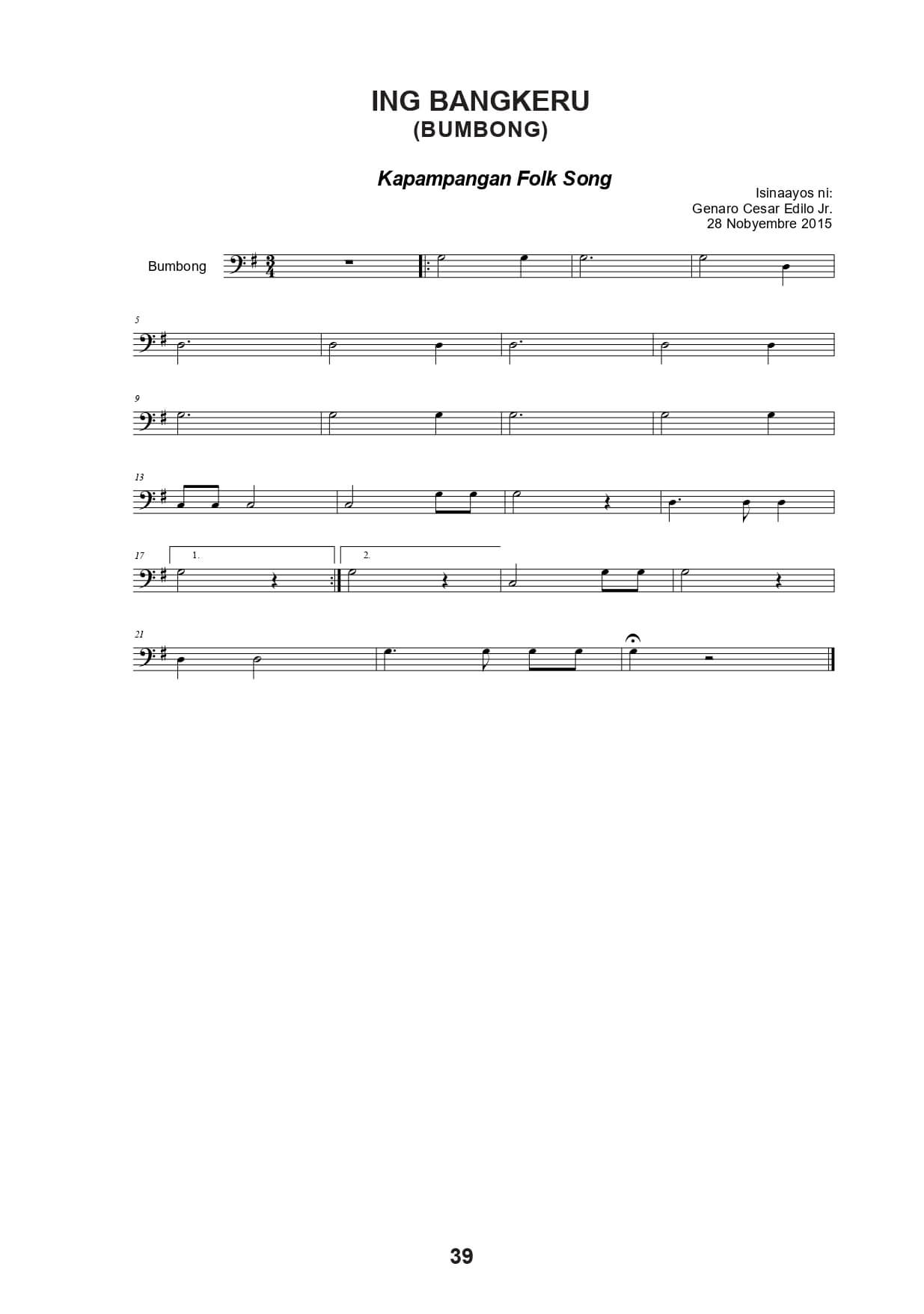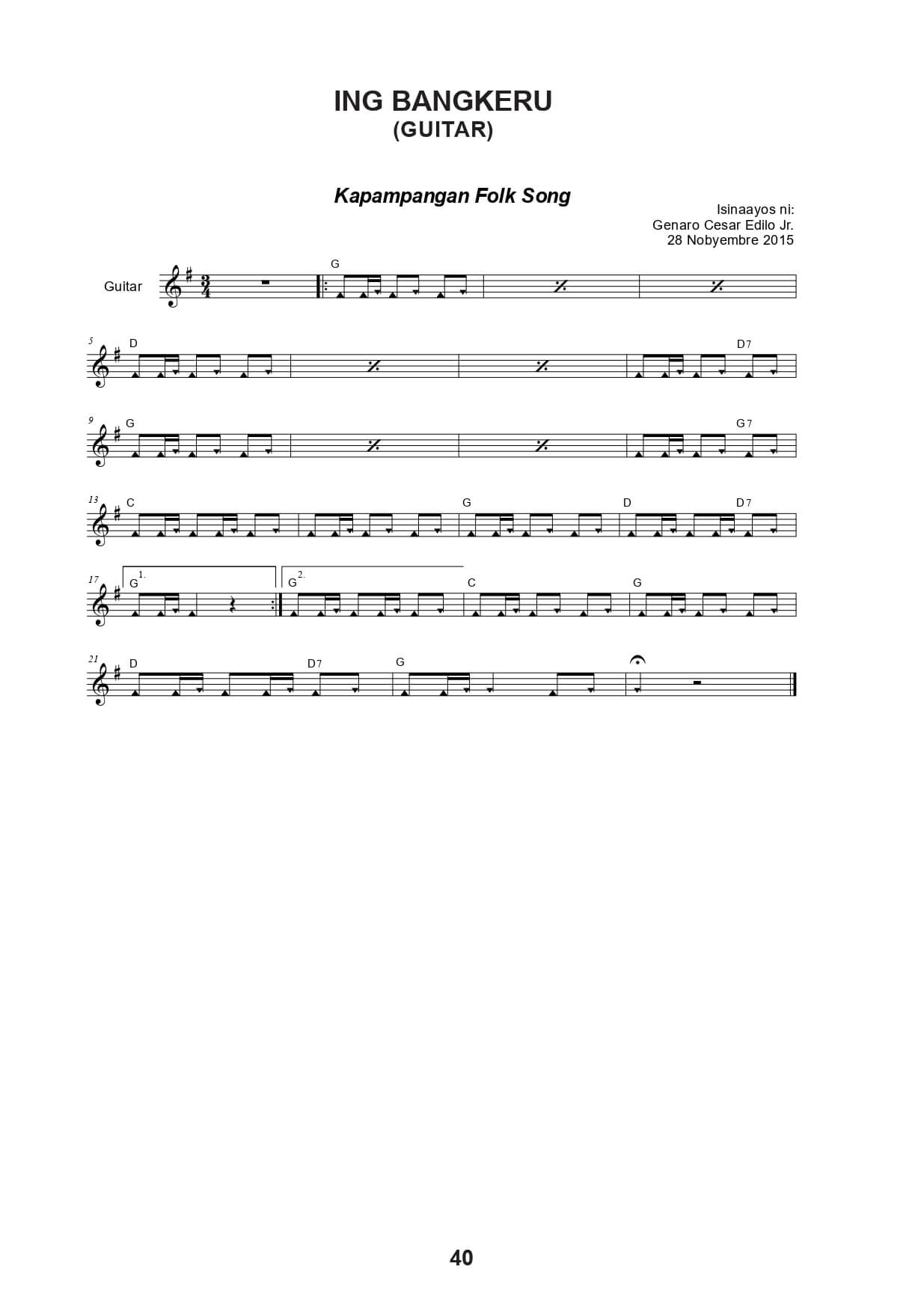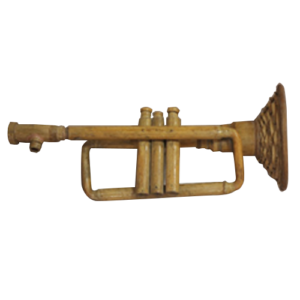Elementary Module
ING BANGKERU REHEARSAL PLAN
- Volume 2
Background
Description: Kapampangan Folk Song
Arranger: Genaro Cesar Edilo Jr., November 2015

Lyrics
ING BANGKERU
Iniang bayu pamu ing Menilang ciudad
Tingca na’t lelangan ning maki-pacultad
Ating escuelahang carelang telacad
Pipagaralan da ding biasa at pantas.
Ding escuelang deti atlu la capindaum
Itang Sto. Tomas at San Juan de Letran
Sta. Teresita Colegio ya naman
Pitatanacan dang isip ding magaral.
Capupus ning banua, misara ing clasi
Masipanuli no sablang estudiante
Caring sibabalen at tagle ra reti
Ing sablang cabiasnan, dangalan at puri.
Metung ya careti ing minting dalakit
Malapad nang pangpang ning ilug
Calumpit Minaus yang bangca caya midalakit
Ngana mamayad cu caras casumangid.
Sinake ne keta itang estudiante
Linucluc maratun ketang taburete
Lidlad neng paying na at saca maniabi
Ustan mu bangkeru ing anticanini.
Iniang mamagse ne libutad ning ilug
Nganing estudiante ustan mu bangkeru
Ding Angeles banua pilan latang
Coruz Ding Santos at Santas pilan nomang tapue.
Mipamulala ya ing bangkerung anac
Kotang estudiante ngana ping mekibat
Pagdamutan yupu ining ipakibat
Uling yang caguiwab na nining pobreng balat.
Anti king acu pu ecu ibat banua
Ecopu binilang Coruz nung pilan la Ila pang balu cu ding Santos at Santa
Metung cung calulung meragul king lauta.
Nung ining icutang yu cacu usisan
Ing sumanga’t mulin ning bangcang secayan
Saca ining bagse ampon ining arcan
Ila pung balu cu ilang keragulan.
King bistat mababa ining pegaralan
Suguing Pilosupu acu namong cutang
Manibatan keti ang aking sadsaran
Ing pamamagse cu pilan cawaswasa?
Balubuc ning danum pangalto ning bula
King panga-tumpuc na pilan libu caya
Canacu mu igcas ban cung ausisa
Anti king Pantas ca biasa ampon sita.
Micamacama ya itang estudiante
Cuang ning bangkeru emecapaniabi
Dinalan king lub na saca ya sinisi
Nung bar acutnan ne ing bangkerung iti.
Ini mu palapung asuas ning bagse cu
Alimu asabi cacu asuertu
Ding Angeles banua ilapang balu mu
Eca naman ibat banuang anti cu.
Tantuan daca ngeni
Pilosupung mambang
Tandanan mu iti emu cacalinguan
Nung me cayabe king clasi magaral
King matas a argue me cucutnanan.
Iniapin pu ngeni culdas nacong bigla
Ding kecong panupa paburen yunopa
King pasisibayu ing alinaco pa
Maniabing palaku king matas a bina.
Lon ye y Luzufer canitang minuna
Sulu yang meyakit king tronos banua
Ing cayang depatan ing migpalalu ya
Ewari menacabag king Impiernong lasa.
Icong makiramdam tutulad ecosa
Ketang estudiante a palalung bina
Megaral yang ditac at miras Menila
Cabalic na niti, tane mangasti.
“Ing Bangkeru” is a Kapampangan song that narrates the life of a student from the countryside who chose to study in Manila. “Ing Bangkeru” mentioned the following schools: Sto. Tomas, San Juan de Letran, and Sta. Teresita Colegio, which were known schools during that time. When the school year ends, the student goes back to the province. Going back to his hometown, the student must cross the Calumpit River by riding a boat. While on the boat, the student asks the boatman about the choirs of angels and saints in the mountain. The boatman answered that he doesn’t know a thing about angels and saints because he is but a simple man. He only knows how to row a boat and the distance of his boat travel. Then the boatman asks the student about the meaning of the bubbles that appeared in the splash of water. To the student’s surprise, he doesn’t know the answer.
“Ing Bangkeru” gives a lesson about education. While the boatman only knows about basic things in life unlike the learned student who goes to school in Manila, one should not brag about The boatman compared knowledge to Lucifer’s case, who became tempted to the light of the throne which caused him to be thrown into hell. The boatman reminds us that we should be humble instead of being arrogant like the student who studies in Manila and mocks other people.
IV. PERFORMANCE GUIDE
A. Materials 
- Audio tracks – Scan QR code on the right
- Sheet music – Ing Bangkeru arrangement by Genaro Cesar Edilo Jr.
B. Guide to the Piece
There is only one section to the arrangement (A). The arrangement is in the key of G major, and the time signature is 3/4. Angklung plays the melody throughout the piece, the marimba plays the 2-part counterpoint, guitar (rhythm), and bumbong (bass) play the accompaniment part.
The piece starts with an upbeat melody of the Angklung. The first eight measures after the upbeat measures make up the first half of the song, while the next eight measures make up the second half. The chordal accompaniment uses the basic chords in I, IV, and V.
After the first ending, which is in measure no. 17, the piece will repeat measure no. 2. From there, perform the piece until measure 16. This time, the ensemble will skip measure 17 and immediately go to measure 18, playing until the piece is completed.
V. REHEARSAL PLAN
| Time (2 Hours Session) |
Material |
Instrument |
Measure |
Objective |
Activity |
Assessment |
| 5 minutes | Warm-ups;
Scales (in Staccato and Legato)
I, IV, and V chords. |
All instruments
angklung, gabbang, and marimba
bumbong |
Develop proper organization skills.
Prepare the player for the rehearsal proper. |
Pre-rehearsal activities:
Prepare materials such as music sheets, mallets, and plectrum.
Assign notes for angklung and bumbong players.
Do some lip vibration for bumbong. |
Check for proper seating positions, mallet technique (marimba), and blowing technique (bumbong).
Check for tuning of the strings, playing position, and chord position. |
|
|
guitar |
Tune the instrument for guitar (frequency of A=440 khz). | |||||
| 5 minutes | Ing Bangkeru video track guide | As a group | Identify the elements used in the piece. | View the video track guide of the piece. | Members assess their musical knowledge
by identifying known elements from the piece and the track guide. |
|
|
Develop ear training. |
Read and show analysis of the piece. | The teacher explains the piece. | ||||
| 10
minutes |
Ing Bangkeru | guitar and bumbong | M. 1–23 | Develop sight reading skills. | Clap the rhythmic patterns. | The teacher corrects how the players execute their parts. |
|
Play properly rhythmic patterns. |
Play the parts individually. [Note: You might begin by playing the section slowly at first until the players become familiar with the notes.]
Sing the notes. |
Guitar players should be able to play the chord progression and strumming pattern accurately.
Bumbong players should be able to produce a good resonant sound. |
||||
| 10
minutes |
gabbang/ marimba | Marimba players should be able to execute
the proper playing technique (tremolo, staccato, legato). |
||||
| 15
minutes |
angklung | Individually, angklung players should execute fine tremolo in their instruments. | ||||
| As a team, they should be able to produce flowing sound as they play the melody of the sound. |
| Time (2 Hours Session) |
Material |
Instrument |
Measure |
Objective |
Activity |
Assessment |
| 10
minutes |
BREAK |
|||||
| 20–30
minutes |
ALL | Entire piece | Show attentiveness to the conductor.
Play the entire piece while observing the appropriate tempo, rhythm, and dynamics. |
Ensemble playing | The teacher should make sure that there is balance as the ensemble plays by being able to hear the other instruments.
The teacher should provide immediate correction, if necessary. |
|
| 10
minutes |
ALL | Practice self and group evaluation | Post-rehearsal evaluation. | The teacher should provide feedback and suggestions about the group’s performance.
Members can also evaluate and assess their performance by reviewing if they played their parts correctly, in coordination and balance with the other instrumental parts of the piece. |
||
Reference
Misajon, Marie Melanie J. ed. Philippine Literature 2009: Regions, Cultures
and Histories. Manila: Seguiban Printing and Publishing Enterprise, Inc., 2009.
No content.
No content.
No content.
No content.
No content.
No content.
Science in a creative industry.
The DOST-FPRDI has a Bamboo Musical Instruments Innovation R&D program aimed at improving the quality of locally-made bamboo musical instruments (BMIs) through science and innovative technologies. The program seeks to standardize the production of selected BMIs, develop prototype designs, analyze raw material sources and existing markets, and build a BMI processing facility. In addition, the program aims to document the ethnocultural story behind several BMIs and identify the bamboo species used in BMI production to promote public awareness and appreciation of the cultural importance of these musical instruments. The program is a collaboration with the University of the Philippines and Philippine Normal University for teaching modules and analyzing sound quality and standardization of BMI design. The DOST Grants-in-Aid program provides funding.
PhBMI

